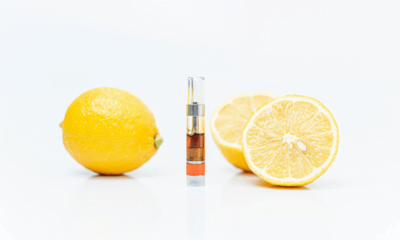Looking forward to gyms reopening in April? Find out how CBD could boost your workout and help you get back to the top of your game.
At the time of writing, gyms in the UK were scheduled to be allowed to reopen on April 12th following the third Covid-19 lockdown.
Whether that happens or not remains to be seen, but no matter if you’re working out in the gym, the park or your own home, did you know cannabidiol can help you recover?

Anyone who exercises will be familiar with the muscle aches and pains that can arise the next day, no matter how fit you are.
Thanks to its anti-inflammatory properties, CBD can be of real benefit when it comes to helping your muscles recover from a workout – and many athletes are already using it.
This is in part due to growing reluctance to over-use traditional painkillers such as NSAIDs – like ibuprofen – or opioids due to the health risks and potential for addiction.
Unsurprisingly, many athletes and sports people are looking for a more natural alternative – and CBD fits the bill.
How does it work?
CBD is famed for its anti-inflammatory properties – and that’s not just anecdotal. According to a 2018 review of 132 original studies published in Frontiers in Neurology, CBD can clearly be seen reduce inflammation in the body and help improve pain and mobility in patients with multiple sclerosis.
“It is anti-inflammatory, antioxidative, antiemetic, antipsychotic, and neuroprotective,” the review study’s authors wrote.
The effect is produced through cannabinoids binding to existing CB2 receptors in the body, which may have an anti-inflammatory effect by reducing cytokine (cell messengers) production.
Furthermore, CBD has also been linked to increased endurance. A study found that the substance could help to boost endorphins while working out by balancing the endocannabinoid system and offering what is known as a ‘runner’s high’. This provides a major athletic advantage for those training, but struggling with motivation.
Is it legal?
Yes. At the beginning of 2018, the World Anti-Doping Agency removed CBD from the list of prohibited substances, whether in or out of competition.
However, all other cannabinoids such as cannabis, marijuana and THC are prohibited in competition due to the receptors activated in the brain which cause a ‘high’.
As far as the UK Anti-Doping is concerned, it advises that CBD products should be considered in the same way as all other dietary supplements and used at the athlete’s own risk.
How to take it
For muscle aches and pains, the best way to administer CBD is topically, through the use of balms, oils or creams. This way, the compound can be directly targeted at the source of the pain, and there is no risk of it interacting with anything else that has been consumed.
Many topical CBD treatments are also combined with other healing elements such as menthol, capsaicin and camphor – giving an extra pain-relieving effect.
However, oils and tinctures taken orally may have quicker results and are the easiest to take – you can pop a few drops under your tongue to increase energy levels during training, and to give you a boost of energy before a workout.
However you choose to use it, CBD could help you get the most out of your workout when we’re finally allowed to hit the gym again.

 News6 months ago
News6 months ago
 Science5 months ago
Science5 months ago
 Industry6 months ago
Industry6 months ago
 News6 months ago
News6 months ago
 News5 months ago
News5 months ago
 Health5 months ago
Health5 months ago
 News5 months ago
News5 months ago
 Health3 months ago
Health3 months ago













